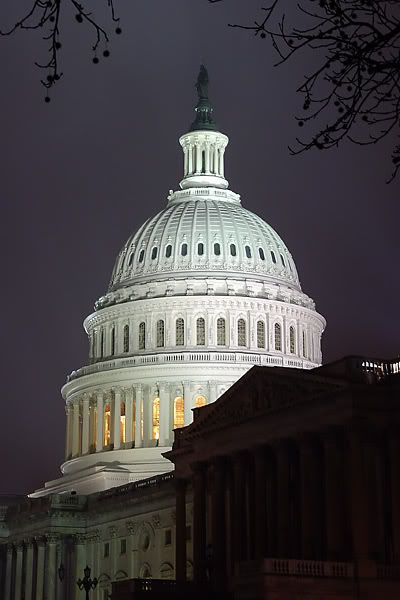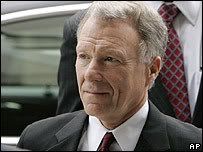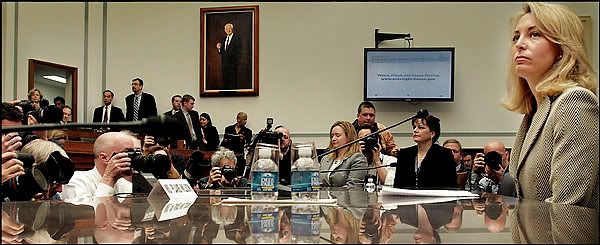In retrospect, Plamegate was a farce in five acts. The first four were scabrous, disgraceful and absurd. Justice only reared its head at the end.
The drama opened, as these dark comedies are wont to do, with a strutting little peacock who went by the unimaginative name of Joe Wilson.
Mr. Wilson claimed that his wife had nothing to do with his trip to investigate Iraqi purchases in Niger, though that seems not to have been the case. He claimed his trip proved Iraq had made no such attempts, though his own report said nothing of the kind.
In short order, Wilson established himself as the charming P.T. Barnum of the National Security set, an inveterate huckster who could be counted on to wrap every actual fact in six layers of embellishment. His small part in the larger fiasco of the Iraq war would not have registered a micron of attention had the villain of the epic — the vice president — not exercised his unfailing talent for vindictive self-destruction.
Act Two opened with a cast of thousands crowding the stage, filling the air with fevered vapors and gleeful rage. Perhaps you can remember those days, when the Plame story pretended to be about the outing of an undercover C.I.A. agent. Perhaps you can remember the howls of outrage from our liberal friends, about the threat to national security, the secret White House plot to discredit its enemies.
Perhaps you remember the media stakeouts of Karl Rove’s driveway, the constant perp-walk photos of Rove on his way to and from the grand jury, the delirious calls from producers (The indictment is coming today! The indictment is coming today!).
There were media types so eager to get Rove, so artificially appalled at the thought of somebody actually leaking classified information, they were willing to forgive prosecutor Patrick Fitzgerald for throwing journalists in jail. It was like watching a city of Ahabs getting deliriously close to the great white whale.
That was back when everybody thought Rove was the key leaker. But then it turned out he wasn’t. Richard Armitage was, as Fitzgerald knew from the start.
By the start of Act Three, nobody cared about the outing of a C.I.A. agent. That part of the scandal disappeared. And all that was left of Joe Wilson and Valerie Plame were the creepy photos in Vanity Fair.
Act Three was the perjury act, and attention shifted to the unlikely figure of Scooter Libby. As Joe Wilson was an absurd man with a plain name, Scooter Libby was a plain man with an absurd name. And the odder thing was that Libby was the only normal person in the asylum. People who knew him thought him discreet, honest and admirable. And yet the charges were brought and the storm clouds of idiocy gathered once more.
Republicans who’d worked themselves up into a spittle-spewing rage because Bill Clinton lied under oath were appalled that anybody would bother with poor Libby over lying under oath. Democrats who were outraged that Bill Clinton was hounded for something as trivial as perjury were furious that Scooter Libby might not be ruined for a crime as heinous as perjury. It was an orgy of shamelessness. The God of Self-Respect took sabbatical.
The trial and sentencing, Act Four, was, to be honest, somewhat anticlimactic. Fitzgerald, having lost all perspective, demanded Libby get a harsh sentence as punishment for crimes he had not been convicted of. The judge, casting himself as David against Goliath, demonstrated an impressive capacity for talking about himself.
And finally, yesterday, came Act Five, and a paradox. Scooter Libby emerged as the least absurd character in the entire drama, and yet he was the one who committed a crime. President Bush entered the stage like a character from another world, a world in which things make sense.
His decision to commute Libby’s sentence but not erase his conviction was exactly right. It punishes him for his perjury, but not for the phantasmagorical political farce that grew to surround him. It takes away his career, but not his family.
Of course, the howlers howl. That is their assigned posture in this drama. They entered howling, they will leave howling and the only thing you can count on is their anger has been cynically manufactured from start to finish.
The farce is over. It has no significance. Nobody but Libby’s family will remember it in a few weeks time. Everyone else will have moved on to other fiascos, other poses, fresher manias.
With this column, Brooks and the rest of the "Pardon Libby"-committee move into Act II of "The Selling of the Commutation; Pardon Comes Later".
The thing that annoys me most about Republicans is that they lie, they do it with ease, lack of conscience, and with no remorse. I know this because after their lies are exposed and the facts are laid out in the sunlight for all to see, they just continue repeating the lies.






